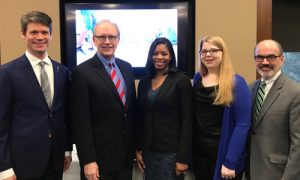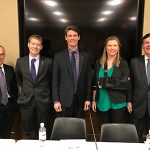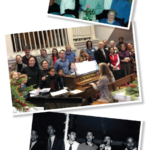Funding drives arthritis research breakthroughs and prevention programs, and advocates from the ACR, Arthritis Foundation and the National Recreation and Park Association (NRPA) pitched funding increases to lawmakers at a lunchtime briefing held Feb. 1 in Washington, D.C., in cooperation with the Congressional Arthritis Caucus.

From left: Arthritis 101 briefing panelists Dr. Angus Worthing, Dr. Chad Helmick, Lesha Spencer-Brown, Erin Vago and moderator Michael Ortman.
During the briefing, titled $300 Billion Crisis: The High Cost and Impact of Arthritis in the United States, presenters highlighted new data from the Centers for Disease Control & Prevention’s (CDC’s) Arthritis Program, “which shows the high toll Americans pay due to arthritis, which affects nearly a quarter of U.S. adults,” said Angus B. Worthing, MD, FACR, FACP, rheumatologist and chair of the ACR’s Government Affairs Committee. He and the other panelists called on Congress to fund an additional $5 million for local CDC arthritis programs, $20 million for research through the U.S. Department of Defense’s Congressionally Directed Medical Research Programs and continued support for the National Institutes of Health.
“We hear from our patients every day about the personal toll arthritis takes on their body, making it hard to work, go to school, take care of their families and even get dressed in the morning,” said Dr. Worthing. Arthritis may even force some people to stop working. “People are losing out on $160 billion in lost wages.” Adding to this, patients and the rest of society pay a high price for treatment. Medical treatment has revolutionized the care of rheumatoid arthritis (RA)—getting people back to their daily lives and drastically cutting the rates for hospitalizations and joint surgery in the case of RA. “But we still don’t have a disease-modifying medication for osteoarthritis,” which affects millions of adults who are still of working age, he said.
“We need concrete solutions to expand access to arthritis care while improving the quality of life for people living with arthritis and rheumatic diseases,” he said. Highlights of event presentations were shared on Twitter with the hashtag #AdvocateForArthritis.
The event’s moderator, Michael Ortman, immediate past chair of the AF, presented a business case for more congressional funding to develop treatment breakthroughs and prevention programs.
Speakers’ Key Points
At the Capitol Hill briefing, speakers shared the latest prevalence statistics on rheumatic diseases in the U.S., as well as how arthritis affects the daily lives of patients. They also outlined current research and public health initiatives that may save costs, keep adults with arthritis working and deliver new treatment breakthroughs. The panelists urged lawmakers to support the CDC Arthritis Program and arthritis research programs at both the National Institutes of Health and the Department of Defense (DoD).
Breakthroughs and public health tools that could improve lives for millions of Americans in the prime of their lives will happen only if there’s money to support them, the panelists stressed.
“Funding government programs is critical not only for the one in four Americans with arthritis, but also for the health of our economy,” said Mr. Ortman. Prior to the event, he emphasized that both the AF and the ACR will continue to pursue additional funding for these key programs to advance treatments and, hopefully, find a cure for arthritis. Congress’ support for research and public health efforts will create a future where “people with arthritis can more fully participate in their communities, while future generations may avoid this expensive condition altogether!”
Personal Stories
Erin Vago, who volunteers as an AF ambassador, shared her own story of living with juvenile arthritis with the audience to make the case for funding support. She was diagnosed with JIA about four years ago. “I’m scared that I won’t be able to provide for myself or pursue my passion—theater—because of arthritis. It’s really intimidating.” Funding medical research to improve treatments for patients like her and her sister, who also has a rheumatic disease, is crucial, she said.
Lesha Spencer-Brown, MPH, the NRPA’s Health and Wellness Program Manager, outlined her association’s health education programs that stress physical activity, such as the Arthritis Foundation’s Walk with Ease, to help patients manage their disease and prevent disability.
Invest in research and prevention now to help control health care costs in the future, panelists stressed. Even young military personnel now develop arthritis due to combat injuries, so support is urgent, said Mr. Ortman.
“Our soldiers come back from the battlefield with a disproportionately large burden of arthritis,” he said. “We can help them with dedicated research funding for arthritis at the DoD.”
“Living with arthritis is incredibly challenging, especially when you’re young,” said Ms. Vago before the event. “I’ve endured hardships, from giving up hobbies to being diagnosed with other conditions, including fibromyalgia. I want to help improve the lives of all people living with arthritis, which is why funding medical research is so important to me.”
Act Now, Reap Rewards Later
At the briefing, speakers presented facts to drive home the point that funding programs now will reap rewards down the road, not only in lives extended and improved, but in saving healthcare costs due to preventing disability and costly disease complications.
“Luckily, Congress supports boosting biomedical research funding through NIH. We’re also calling on Congress to fund two critical areas of research and outreach at the CDC and the Department of Defense,” said Dr. Worthing. “CDC arthritis programs not only give us the basic statistics about arthritis in the U.S., but also give Americans tools to use through educational awareness campaigns. Also, we see military servicemen and women are suffering from arthritis because of injuries and other troubles, so we’re asking Congress to use existing funds to establish a $20 million dedicated arthritis research program at the DoD to accelerate prevention strategies and treatment breakthroughs.”
Susan Bernstein is a freelance journalist based in Atlanta.


